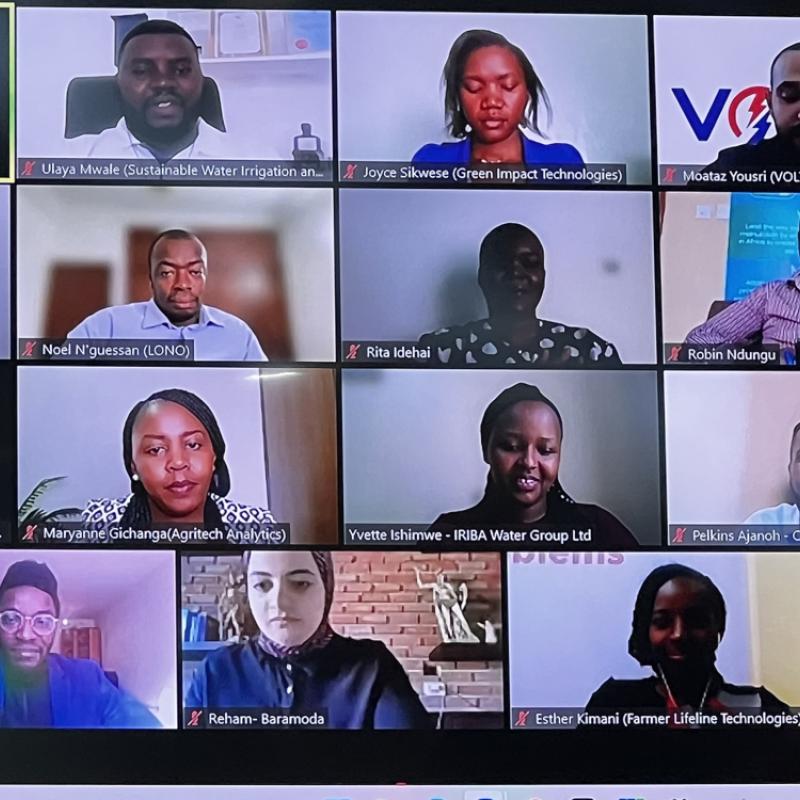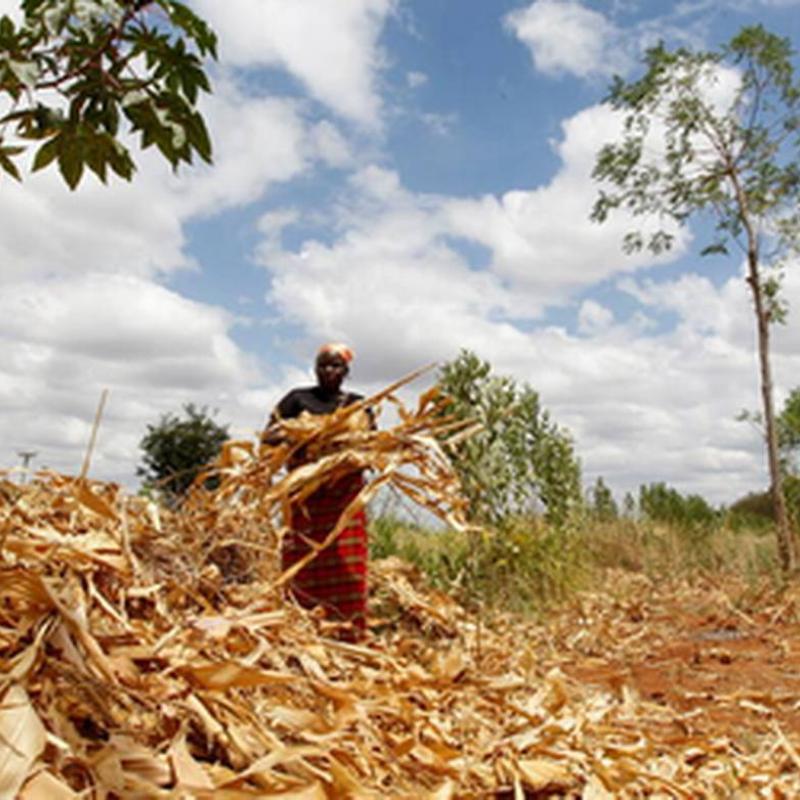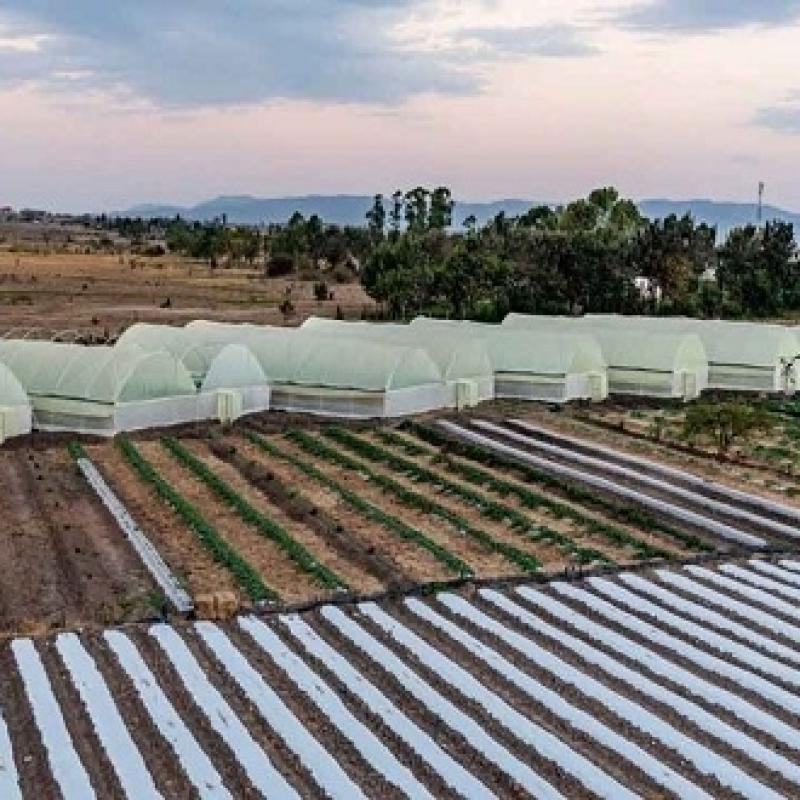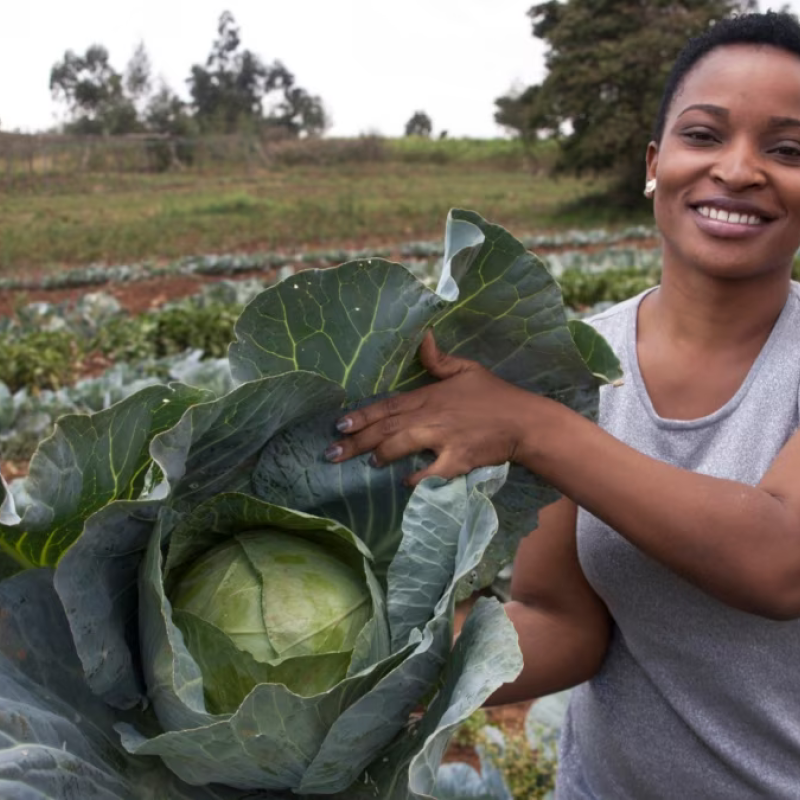
AAAP in the Media
Displaying 1 - 12 of 16
Global Leaders Rally Support and Finance for the Africa Adaptation Acceleration Program to Tackle Climate Change in Africa
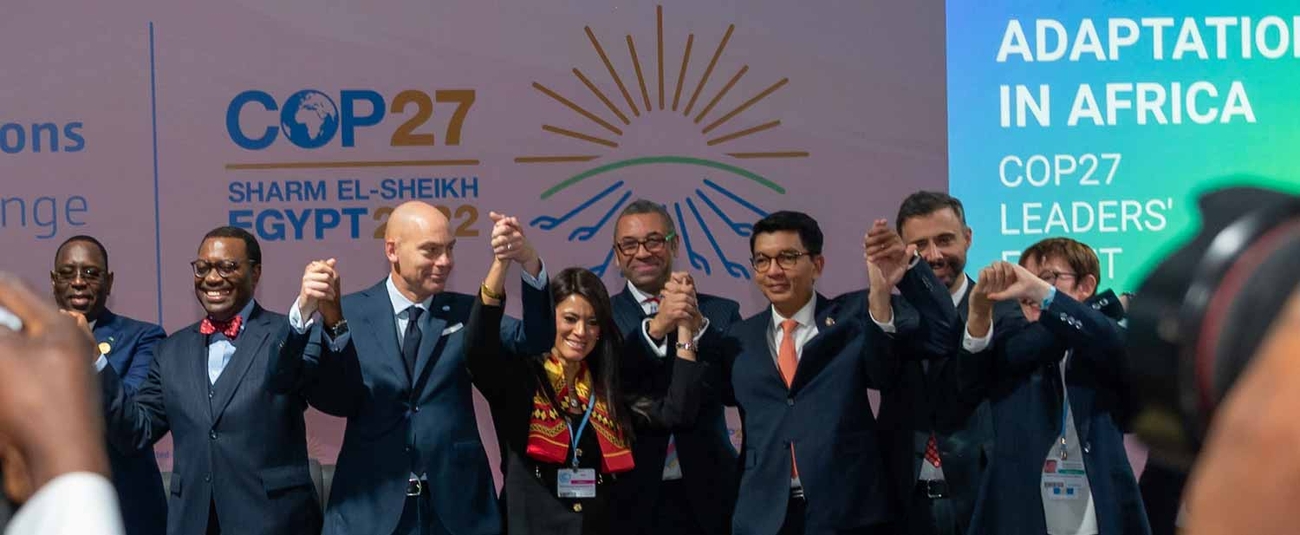
Global leaders on Tuesday rallied around climate adaptation for Africa. They attended the Africa Adaptation Leaders’ Event, convened by African Union Chair President Macky Sall of Senegal, Global Center on Adaptation CEO Patrick Verkooijen, and African Development Bank Group President Akinwumi Adesina.
The event took place at the global climate summit (COP27) in Sharm El-Sheikh, Egypt. It underscored the critical need for climate adaptation in Africa and responded to the call for the capitalization of the Africa Adaptation Acceleration Program (AAAP).
“This is a pivotal step in the fight against climate change,” African Union Chair President Macky Sall said. “The commitments made by Africa’s partners will give the Africa Adaptation Acceleration Program the boost that it needs to transform the development trajectory of the world’s most climate exposed continent. I am confident in the ability of the AAAP to deliver results for Africa.”
The Africa Adaptation Acceleration Program is an Africa-owned and Africa-led initiative developed by the Global Center on Adaptation (GCA) and the African Development Bank (AfDB) in close collaboration with the African Union. It serves as the implementation of the Africa Adaptation Initiative (AAI) to mobilize $25 billion to implement, scale and accelerate climate adaptation across the Africa. Since 2021, AAAP has mainstreamed climate adaptation in over$3.5 billion of investments in 19 countries.
United Nations Secretary-General António Guterres said: “I want to express my total solidarity for the Africa Adaptation Acceleration Program […] I urge the international community to support Africa to mobilize the technical & financial resources for scaling up transformative adaptation.”
“With this innovative program, Africa has developed a plan to grow, create jobs and opportunities for people, and to be resilient against the climate crisis,” said President Akufo-Addo of Ghana. “AAAP’s singular focus on the issue of climate adaptation will also contribute to greater stability and progress in Africa and around the world. AAAP is aligned with Ghana’s plans to address climate change as it chairs the Climate Vulnerability Forum (CVF) to lead efforts from the world’s most climate vulnerable countries to spur and mobilize investment through the Climate Prosperity Plans."
James Cleverly, Secretary of State for Foreign, Commonwealth and Development Affairs of the United Kingdom announced that the UK will provide £200 million to the African Development Bank’s Climate Action Window. This is in addition to the £20 million announced at COP26 in Glasgow to the AAAP Upstream Financing Facility.
Cleverly noted: “Climate change is having a devastating impact on countries in Sub-Saharan Africa facing drought and extreme weather patterns, which have historically received a tiny proportion of climate finance. This new mechanism […] will see vital funds delivered to those most affected by the impacts of climate change, much more quickly.”
Prime Minister Mark Rutte of the Netherlands followed through on the commitment made at the Africa Adaptation Summit held at the Global Center on Adaptation in September to confirm that the Netherlands will contribute EUR110 million to the AAAP, with EUR10 million in support for the Upstream Financing Facility hosted by GCA and EUR 100 million for the Climate Action Window of the African Development Fund at the African Development Bank as part of the Netherlands’ commitment to dedicate half of its climate funding, fully grant based, to climate adaptation, with a focus on Africa.
Norwegian Prime Minister Jonas Gahr Støre echoed African leaders’ calls for countries to rapidly scale up finance for climate adaptation, stating: “The climate crisis is here and now. Years of progress are at risk.”
“The AAAP Upstream Financing Facility is the delivery mechanism of adaptation and will use millions to leverage the billions that is required for adaptation,” he continued. “AAAP projects will generate effective climate adaptation outcomes. Adaptation is a growth agenda. A jobs agenda. And a prosperity agenda. On behalf of Norway, I am looking forward to continuing this partnership, investing in it, and supporting it with the Global Center on Adaptation.”
International Monetary Fund Managing Director Kristalina Georgieva emphasized the need to accelerate adaptation in Africa, stating: “It is paramount to support Africa’s adaptation because Africa will not reach its tremendous potential without it. AAAP complements the IMF’s Resilience and Sustainability Trust, which helps countries address external shocks such as climate change and ensure sustainable growth that can give Africa a chance to leapfrog outdated development models.”
African Development Bank Group President Dr. Akinwumi Adesina said: “Africa is suffering from the devastating effects of climate change. Our continent is being short changed by climate finance. The contributions towards the Africa Adaptation Acceleration Program’s Upstream Financing Facility and the Climate Action Window – which the African Development Bank manages – will help capitalize the program. With increased capital, we can better deliver the investment needed to bridge the adaptation finance gap. We want to ensure that the most vulnerable communities can benefit from a sustainable and prosperous future.”
Endorsing the outcomes of the high-level meeting, Patrick Verkooijen, CEO of the Global Center on Adaptation, closed with a statement emphasizing the AAAP’s impact to date, noting that “there is no pause button on the climate crisis. Africa must adapt to the threat of climate change, and it must adapt now.”
“Through the AAAP,” he continued, “Africa has charted its path towards a climate-resilient future for its youth, its economic growth, and for its prosperity.”
About the Global Center on Adaptation
The Global Center on Adaptation (GCA) is an international organization which works as a solutions broker to accelerate action and support for adaptation solutions, from the international to the local, in partnership with the public and private sector, to ensure we learn from each other and work together for a climate-resilient future. Founded in 2018, GCA is hosted by the Netherlands, working from its headquarters in Rotterdam with a knowledge and research hub based in Groningen. GCA has a worldwide network of regional offices in Abidjan, Côte d’Ivoire, Dhaka, Bangladesh and Beijing, China. Through this evolving network of offices and global and regional GCA teams, the organization engages in high-level policy activities, new research contributions, communications, and technical assistance to governments and the private sector.
About the African Development Bank
The African Development Bank Group is Africa’s premier development organization. Its overarching objective is to spur sustainable economic development and social progress in its regional member countries, thus contributing to poverty reduction across the continent.
The Bank Group achieves this objective by mobilizing and allocating resources for investment in African countries and providing policy advice and technical assistance to support development efforts.
In 2015, all multilateral development institutions agreed on the same set of objectives, the United Nations Sustainable Development Goals.
Learn more: https://www.afdb.org/
About the Africa Adaptation Acceleration Program
The Africa Adaptation Acceleration Program (AAAP) is a joint initiative of the African Development Bank and the Global Center on Adaptation (GCA). It aims to mobilize $25 billion, over five years, to accelerate and scale climate adaptation action across the continent. This ambition is delivered through the AAAP Upstream Financing Facility managed by the Global Center on Adaptation and the African Development Bank’s climate action window in the ADF replenishment. AAAP works across four pillars to achieve transformational results: Climate-Smart Digital Technologies for Agriculture and Food Security; African Infrastructure Resilience Accelerator; Youth Empowerment for Entrepreneurship and Job Creation in Climate Adaptation and Resilience and Innovative Financial Initiatives for Africa. AAAP has already guided over $3.5 billion of upstream investments in 19 countries with every dollar spent influencing $100 downstream.
COP27 - COP27 Leaders' Event, Accelerating Adaptation in Africa (DAY 2)
Africa Adaptation Acceleration Program showcases African youths driving climate innovation
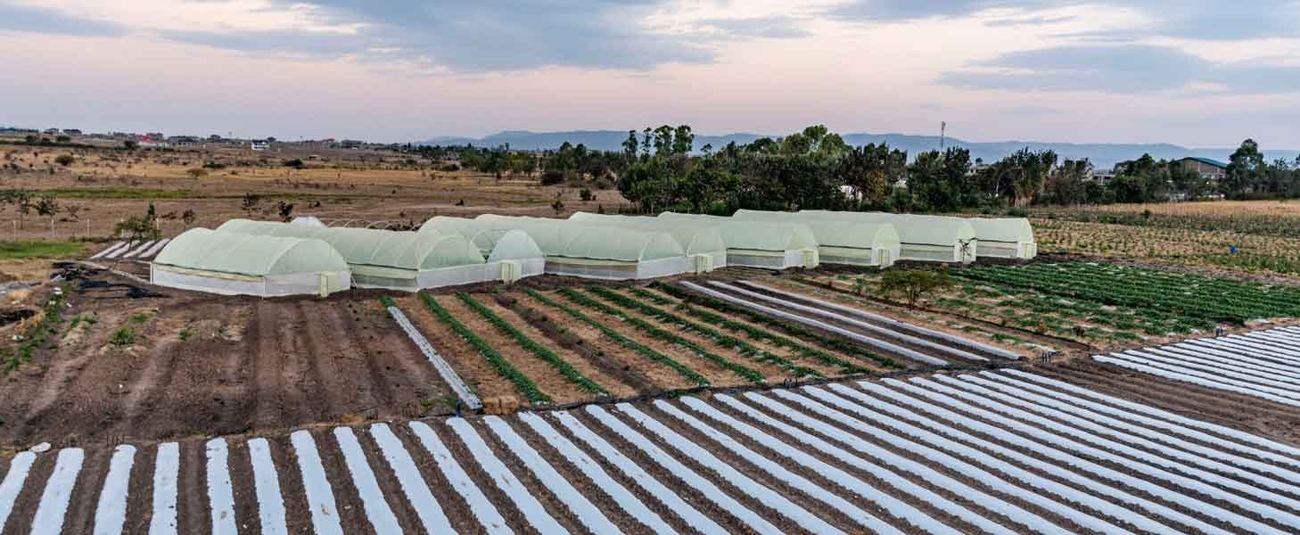
The Africa Adaptation Acceleration program (AAAP) – a joint initiative of the African Development Bank and the Global Center on Adaptation – recently showcased its initiative to harness the dynamism and leadership of Africa’s youth to drive climate adaption innovation.
On the side-lines of the recent 3rd Gobeshona Global Conference(link is external), AAAP brought together participants in its YouthADAPT program to share their experiences with the program as well as strategies to scale up youth-led approaches to adaptation
In his opening remarks, Dr. Kevin Kariuki, African Development Bank Vice President for Power, Energy, and Climate & Green Growth underscored young people’s integral role in Africa’s sustainable development.
“Youth form the backbone of Africa’s population, constituting over 60% of the population. The continent’s sustainable development hinges on harnessing this demographic dividend,” Kariuki said. “The AAAP, through its YouthADAPT pillar, has so far supported 35 youth-led enterprises in 14 African countries with $3.5 million to drive climate actions in sectors such as agriculture, waste management, renewable energy, water and sanitation,” Kariuki added. YouthADAPT is one of AAAPs four pillars for accelerating climate adaptation.
Caroline Mukuhi Mwangi, founder of Kimplanter Seedling(link is external) and Nurseries Limited, said her company was already seeing the benefits of participation in the program. Kimplanter provides drought resistant seedlings that boost food production and food security in Kenya.
Mwangi said, “We have ventured into new markets in semi-arid regions and expanded our seedling varieties, increasing our revenue by 36% as a result of AAAP support. Our customer base has also grown from 8,000 to 16,000 farmers and we have increased our staff from 17 to 32, all of whom are women or youth.”
Aramide Abe, the Program Lead of Jobs for Youth & Entrepreneurship at the Global Center on Adaptation(link is external) confirmed that participating enterprises have already begun to show results. She said some have seen revenues rise by up to 50 percent. A fifth have ventured into new markets and have raised over $106,000 in additional funding from different sources.
Juveline Ngum, the founder of Bleaglee Waste Management Limited, a Cameroon-based start-up company using drone technology to tackle waste disposal, also stressed the benefits of participating in YouthADAPT.
“We have expanded our waste disposal management solution from west Cameroon into Douala, effectively using drones to detect clogged drainages and utilizing data for demand driven waste management,” Ngum said. Now, we aim to expand across national borders into Dakar, Senegal.”
Noël N'guessan’s Cote d’Ivoire-based company, LONO(link is external) – a winner of the 2022 YouthADAPT challenge – has patented technology for the production of organic fertilizer. The company has also introduced modular and mobile bio digesters for the agri-food sector. Biodigesters use microbes and other bacteria to break down organic waste including fat, greases, and even animal manure.
Still, Nguessan said challenges remained. “The cost of prototyping hardware equipment can be prohibitively high, resulting in lengthy project development cycles, “he said. He pointed to financial management training as vital for youth-led businesses.
The session also featured presentations by African Development Bank partners and other global organizations that have rolled out similar initiatives to YouthAdapt.
Sandra Simbiri, Program Specialist at UNICEF’s Generation Unlimited(link is external), said:
“Supporting entrepreneurs through STEM principles is key to preparing the young for technological innovations.”
Alfred Asiko, Senior Market Engagement Manager for the ClimateTech Programme at GSMA(link is external), a mobile technology association, said it has played a role in empowering youth to deploy such technologies as the Internet of Things, artificial intelligence and blockchain to tackle climate challenges.
“Through our innovation fund, we offer grants to climate startups, with a focus on supporting resilient solutions that utilize frontier technologies. We also provide skills development and training to help entrepreneurs succeed in scaling their innovations,” Asiko said.
He said that venture capital (VCs) firms had a critical role to play. ”We need to see more VCs stepping up and taking over from development finance institutions (DFIs) in providing financing and support to youth-led businesses,” he added.
YouthADAPT targets reaching 10, 000 African youth-led enterprises by 2025, promoting innovation and inclusive growth for young people in climate resilient jobs and through youth enterprise development. The AAAP’s other three pillars are Climate-Smart Digital Technologies for Agriculture and Food Security; the African Infrastructure Resilience Accelerator and the Innovative Financial Initiatives for Africa
The third annual Gobeshona Global Conference, organized by the International Centre for Climate Change and Development, took place virtually from 10-16 March 2023. It focused on monitoring Locally- Led Adaptation (LLA) and resilience.
African Development Bank and Global Center on Adaptation work with partners to enhance capacity to access climate adaptation funding
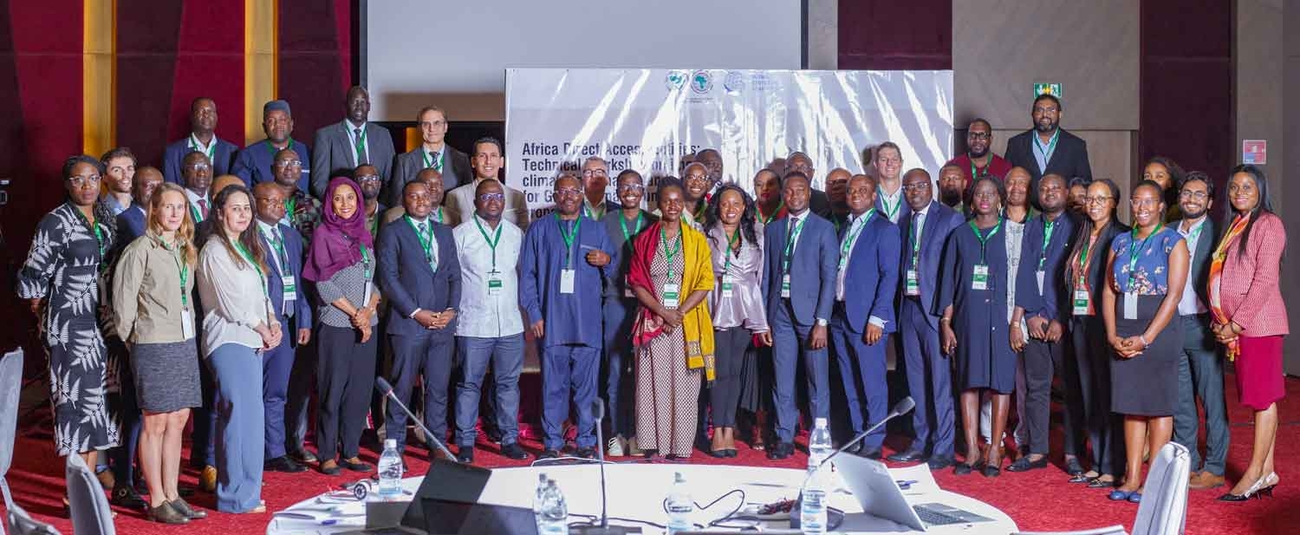
The African Development Bank and Global Center on Adaptation today launched a new initiative under the Technical Assistant Programme of the Africa Adaptation Acceleration Program(link is external) to help African countries access more climate adaptation funding.
A climate rationale is the scientific basis of a project and describes the climate change scenario, outlining the climate problem in a particular country (e.g., flooding, droughts for an adaptation project) and region that the project will be implemented in. The rigorous requirement by Green Climate Fund for climate rationale based on 30 years of point-source climate data has led to a high attrition rate for funding proposals with an adaptation focus.
Through this new initiative, Direct Access Entities in Africa will receive additional support to enhance their capacity with regards to climate data, tools, and methodologies that help them meet the critical requirements of climate rationale for compelling funding proposals that could merit approval by the GCF Board.
The GCF is one of the mechanisms of the United Nations Framework Convention on Climate Change to significantly contribute to the global efforts towards attaining the goals set by the international community to combat climate change. It supports developing countries to limit or reduce their greenhouse gas emissions and adapt to climate change impacts. For adaptation, it allocates resources based on: (i) the ability of a proposed activity to demonstrate its potential to adapt to the impacts of climate change by promoting sustainable development and a paradigm shift; (ii) the urgent and immediate needs of vulnerable countries, in particular, Least Developed Countries, Small Island Developing States and African States.
The African Development Bank and the Global Center on Adaptation will work with their partners to select at least four proposals each year based on the pipeline of Direct Access Entities funding proposals that require additional technical assistance and guidance. Through its Technical Assistance Programme (TAP), the Global Center on Adaptation will provide technical assistance for a selected set of funding proposals.
The launch event for the new initiative took place in Abidjan, Cote d’Ivoire, on the 6th and 7th of December with program partners including the Green Climate Fund (GCF), World Meteorological Organization (WMO), Africa Climate Change Fund, ClimDev Special Fund and Regional Climate Centers in Africa.
23 Direct Access Entities accredited or at the final stage of accreditation to GCF participated in the two-day event with representatives of regional and international accredited entities, including the Development Bank of Southern Africa, the International Fund for Agricultural Development, the West African Development Bank, the Africa Finance Corporation and the United Nations Environment Program.
In opening remarks,Professor Anthony O. Nyong, Senior Director for Africa at the Global Center on Adaptation said , “Africa is on the frontline of our climate emergency. Through this new initiative, we aim to significantly increase the flow of adaptation finance to the region. Given the central role of the Green Climate Fund, the unprecedented volumes of funding it offers, the range of financial instruments it provides, and its different access modalities, we will initially focus this initiative on accessing GCF resources, but this is just the start of our long-term partnership with African countries to mobilize finance for climate adaptation across the continent. »
Dr. Al Hamndou Dorsouma, Acting Director of the Department of Climate Change and Green Growth at the African Development Bank, said, “climate rationale for GCF funding proposal is like the foundation of a building. A solid building should have a solid foundation and I am glad our bank has forged the collaboration with relevant regional and international institutions to help direct access entities secure approvals for more funding proposals on adaptation with strong climate rationale.”
Dr. Kevin Horsburgh, Lead Climate Scientist representing GCF, noted, “To promote transformational projects and catalyze climate finance at scale, GCF follows a four-pronged approach: transformational planning; catalyzing innovation; de-risking high impact projects; and aligning finance with sustainable development. Each step needs the best available information to assist decision-making. The GCF is pleased to be working with the WMO to create the bridge between climate information and all those who need to use it, to improve access to climate finance.”
Amir Delju, Senior Scientific Officer with the World Meteorological Organization, said, “Effective and progressive response to the urgent threat of climate change should be based on ‘the best available scientific knowledge.’ We recognize that it is very challenging for least developed countries to meet this requirement. As an expert service provider, WMO will continue providing the full value cycle of climate services, from data to analysis, information production, interpretation of the findings, and expert advice.”
Contact:
- Romaric OLLO HIEN, Communication and External Relations Department, African Development Bank, email: media@afdb.org(link sends e-mail)
- Technical Contact: Timothy Afful-Koomson, GCF Coordinator, African Development Bank, email: t.afful-koomson@afdb.org(link sends e-mail)
- Technical Contact: Ali Haider, Senior Program Officer, Climate Finance, Global Center on Adaptation, email: ali.haider@gca.org(link sends e-mail)
Africa Climate Change Fund launches Women and Youth Entrepreneurship Project
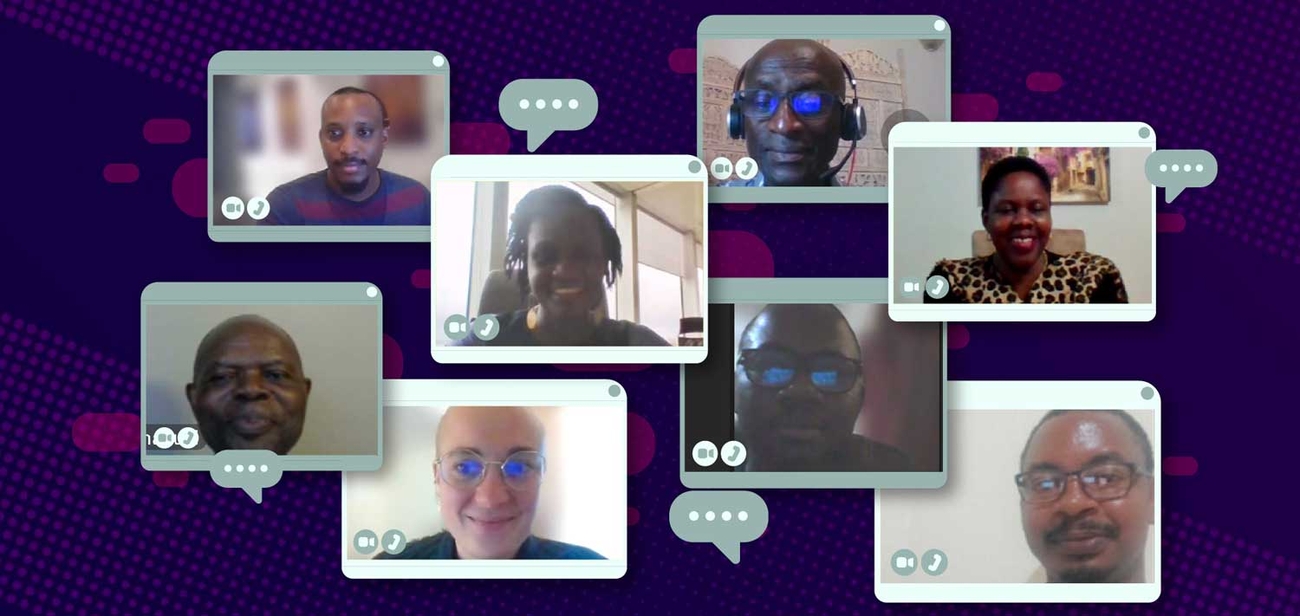
The Africa Climate Change Fund (ACCF) Secretariat has launched a scheme to support mechanisms for climate adaptation finance for women entrepreneurs and youth.
The scheme, “YouthADAPT: Empowering Women and Youth for Entrepreneurship and Job Creation in Climate Adaptation and Resilience,” will develop innovative, transformative climate-resilient bankable projects aligned with African countries’ Nationally Determined Contributions.
YouthADAPT is a flagship program under the Africa Adaptation Acceleration Program (AAAP), which is unlocking the untapped potential of youth in Africa to drive resilience and green enterprise.
The virtual launch followed the approval of a $1 million grant funding by the ACCF’s development partners for the project. The event rallied together stakeholders, including the project team, quality control, adaptation, gender, and communication experts, and climate change and green growth experts to share experiences.
ACCF Coordinator Rita Effah, and the Portfolio Officer, Lucy Debrion, explained the Fund’s operational guidelines on Bank-implemented projects.
AAAP Coordinator and Principal Climate Change Officer Edith Ofwona Adera said, "African youth are leading the way, not in talk, but in concrete climate action; as agents of change, innovators, and entrepreneurs.”
She said the scheme would support women-led local enterprises promoting adaptation solutions to create additional jobs.
Adera thanked the ACCF for collaborating on the projects. Adera also commended the Fund for its role in facilitating the production of proposals. “That makes our work easier,” she added.
Following the launch, the AAAP secretariat will regularly engage with the ACCF Secretariat on significant project milestones to ensure that the objective is fully accomplished.
Since 2017, the ACCF Governing Committees have approved 26 projects estimated at $15.87 million.
The AAAP will implement the project. For more information on ACCF and AAAP, please visit http://accf.afdb.org and www.afdb.org/aaap
20 young African entrepreneurs bag $100,000 each to boost their climate adaptation businesses
Out of Ukraine war, a plan for Africa's food security
Programme Showcases African youths driving climate novelty
Webinar: Climate Change: What does it mean for the Financial Sector in Africa?
The webinar “Climate Change: What does it mean for the Financial Sector in Africa?” will take a holistic perspective to discuss the implications of climate change for the whole financial sector in Africa
Event description:
The African Development Bank (AfDB), Global Center on Adaptation (GCA), UNEP FI and the Secretariat of Making Finance Work for Africa Partnership (MFW4A), in partnership with the African Financial Alliance on Climate Change (AFAC), are convening a series of webinars on Climate Change and the Financial Sector to raise awareness around the risks and opportunities. The series will consist of three/four webinars addressing specific subjects.
The first webinar entitled “Climate Change: What does it mean for the Financial Sector in Africa?” will take a holistic perspective to discuss the implications of climate change for the whole financial sector in Africa while subsequent webinars will focus on specific subsets of the financial sector (banks, insurance, financial markets).
Background
The African financial sector has a critical role to play in Africa’s and adaptation to climate change and to ensure a sustainable and inclusive growth on the continent. Africa’s climate finance markets need to scale to help finance the $4.76–$4.84 trillion needed by 2050 representing annual flows of $163.4–$173 billion for climate resilience and a just energy transition
There is therefore an urgent need for all African financial sector stakeholders – Government authorities, regulators, and financial institutions – to better understand and manage climate change risks to their economies. This also offer opportunities for the sector.
Objectives
Financial institutions can play an important role in society’s adaptation to climate change risks mitigation. This webinar will highlight risks and opportunities that climate change poses for the financial sector in Africa and discuss how financial institutions can best respond to these, in a sustainable manner. In particular, the webinar is expected to:
- Raise awareness on climate change within the financial industry in Africa and facilitate a broader dialogue aimed at integrating climate change considerations;
- Clarify the pivotal role the financial sector can play in mitigating climate change risks and adapting to its effects; and
- Present examples of transformative change in financial institutions’ practices
Business as usual is not enough to mitigate and adapt climate change risks for Africa over the next decade – Africa Adaptation Acceleration Program

Parts of Africa are heating up twice as fast as the rest of the world, requiring urgent action to tackle a challenge that has mounted over the last decade, participants at an Africa Adaptation Acceleration Program webinar heard.
The Africa Adaptation Acceleration Program is a joint initiative of the African Development Bank and the Global Center on Adaptation.
The webinar, held on 29 June as part of London Climate Action Week, explored the implications for Africa of the recently released Intergovernmental Panel on Climate Change’s (IPCC) sixth assessment reports. The reports provide updated assessments of global progress on climate change adaptation, mitigation and related pledges, and examine the sources of global emissions.
Moderated by Josué Tanaka, Visiting Professor in Practice, Grantham Research Institute on Climate Change & the Environment, the session discussed the Working group I report, Climate Change 2021: The Physical Science Basis; the Working Group II report 'Impacts, Adaptation and Vulnerability’; and the Working Group III report, Climate Change 2022: Mitigation of Climate Change.
Speakers included representatives of the IPCC, and a panel comprising policy, private sector and academia representatives.
In opening remarks, James Kinyangi, the ClimDev-Africa Special Fund coordinator at the African Development Bank, said that of a sampling of 30 African countries, over 60% are warming faster than the global average. Kinyangi was speaking on behalf of the African Development Bank’s Ag. Director for Climate Change and Green Growth.
Kinyangi said: “What are the transformative actions we need to take to mitigate risks of climate change? How can we adapt?” he probed.
Prof. Anthony Nyong, the Global Center on Adaptation’s Regional Director for Africa, said that keeping global warming below the 1.5℃ threshold would require doing things differently during the next decade than in recent years.
“Even if the world succeeds in keeping global warming below the threshold, there will still be some casualties along the way, especially for those on the front lines of climate change,” Nyong said, adding, “Africa is on the frontlines.”
Findings of the IPCC reports and Implications for Africa
In a presentation of the reports’ findings, Aïda Diongue-Niang, IPCC Working Group I lead author, warned that without immediate rapid and large-scale reductions in greenhouse gas emissions, the 1.5℃ climate increase threshold will likely be crossed by 2030.
“Regardless of the level of global greenhouse gas emissions, sea levels will continue to rise until at least mid-century, leading to an increase in the frequency and severity of coastal flooding in low-lying areas and coastal regions,” Diongue-Niang said.
Dr. Edmond Totin, a member of IPCC Working Group II, said that over the past two decades, approximately 46,000 deaths recorded in Africa could be linked to natural disasters. Of these, 32% were caused by floods, while 46% were drought-related.
He observed that climate change has had a huge negative impact on health, including malaria incidents in Eastern Africa, a region that has suffered more frequent tropical cyclones. The incidence of cholera outbreaks has grown in frequency in both East and Southern Africa.
Yamina Saheb, IPCC Working Group III Lead Author, emphasized that greenhouse gases can be reduced by up to 70% if demand for energy, material, water and land is significantly reduced.
Chitembo Kawimbe Chunga of Zambia’s Ministry of Green Economy and Environment said national and local governments have a critical role to play in ensuring that Africa advances in climate adaptation and building resilience.
Philip Antwi-Agyei of Ghana’s Kwame Nkrumah University of Science & Technology noted that while climate change adaptation strategies could cushion some of the impacts for smallholder farmers in sub-Saharan Africa, there would likely be trade-offs that must be well communicated.
These trade-offs might include higher costs, additional labor requirements, and competition among objectives or available resources, Antwi-Agyei said. He added that there would also be synergies arising from implementing adaptation measures, including increased productivity, yield stability, and environmental protection.
Olumide Lala, Director of Climate Transition, enjoined African countries to improve their data collection and urged increased finance for adaptation, which typically receives less funding than mitigation.
Owing to a lack of funding, staffing, and technological infrastructure, Africa has just one-eighth the minimum density of weather stations recommended by the World Meteorological Organization, despite being the most vulnerable continent to climate change.
The webinar closed with a call for participants to amplify the findings within communities, governments and other stakeholder entities.
Learn more about the report’s main messages here: https://www.ipcc.ch/report/ar6/wg2/resources/spm-headline-statements/

